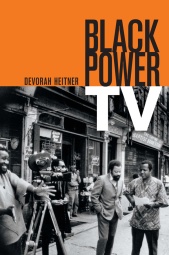In today’s guest post, Gayle Wald shares her appreciation for the TV show Soul! and the new movie Mr. Soul!, about its creator, Ellis Haizlip. Wald is Professor of American Studies at George Washington University and author of It′s Been Beautiful: Soul! and Black Power Television (2015).
In one of the last episodes of Soul!, Ellis Haizlip mused prophetically on the cancellation of the TV show he had been producing and hosting for five years. Emerging on New York public broadcasting in the aftermath of the long summer of 1968, Soul! had demonstrated the ability of a supposedly “cold” medium to translate the warmth of Black American collective at a revolutionary moment in U.S. history. Combining performance and talk, the show gave a platform to an astonishing number of Black political and artistic luminaries, from the women of Labelle to Earth, Wind and Fire to the gospel singer Marion Williams, and from Kathleen Cleaver to Harry Belafonte to Louis Farrakhan. By 1973, Soul was on the way out, another casualty of the nation’s counter-revolutionary turn away from the “arc of justice.”
“Sometimes it is necessary in the evolution of things to disappear,” Haizlip said in that February 1973 episode, his eyes trained on the camera so as to address viewers directly. “We will continue to communicate.”
 Soul! did indeed disappear in a way, if by disappear we mean get written out of history. Before the publication of Devorah Heitner’s groundbreaking study Black Power TV (Duke 2013), it was infrequently referenced, and had even been omitted even from reference books. But what Haizlip often referred to as the program’s “vibrations” did endure, in the form of both living memory and collective consciousness. Soul! ended its on-air run when the Corporation of Public Broadcasting moved to fund more overtly “integrationist” representations, but the ideas, attitudes, and affects it sparked were not so easily extinguished.
Soul! did indeed disappear in a way, if by disappear we mean get written out of history. Before the publication of Devorah Heitner’s groundbreaking study Black Power TV (Duke 2013), it was infrequently referenced, and had even been omitted even from reference books. But what Haizlip often referred to as the program’s “vibrations” did endure, in the form of both living memory and collective consciousness. Soul! ended its on-air run when the Corporation of Public Broadcasting moved to fund more overtly “integrationist” representations, but the ideas, attitudes, and affects it sparked were not so easily extinguished.
 In my 2015 book It’s Been Beautiful: Soul! and Black Power Television, I wrote about the affective, political, and aesthetic afterlives of Soul!, mindful of my own powerful attraction to the possibilities it projected through its bold and inclusive representation of “soul culture.” Soul!’s radicalism was manifested in its direct address to Black viewers, imagined as part of a “soul” collective. Yet even as an outsider to this collective, in watching it decades later I still felt the tug of its utopian imaginings.
In my 2015 book It’s Been Beautiful: Soul! and Black Power Television, I wrote about the affective, political, and aesthetic afterlives of Soul!, mindful of my own powerful attraction to the possibilities it projected through its bold and inclusive representation of “soul culture.” Soul!’s radicalism was manifested in its direct address to Black viewers, imagined as part of a “soul” collective. Yet even as an outsider to this collective, in watching it decades later I still felt the tug of its utopian imaginings.
Melissa Haizlip’s documentary Mr. Soul!, now airing on demand after making its rounds through festival circuits, where it was an audience favorite, arrives at a moment when we are once again, as in the summer of 1968, wondering whether calls for “law and order” will be allowed to drown out calls for justice and reparation. I had been in discussion with Haizlip, Ellis Haizlip’s niece, as an adviser and make a brief “expert” appearance in the film.
But it was not until I first experienced it, with a sold-out audience at the 2018 Tribeca Film Festival, that I felt the “vibrations” Haizlip had talked about. In the palpable pleasure of festival viewers of Mr. Soul! in being treated to memorable performances and discussions from Soul! archive, I saw the reactions of the show’s original, in-studio audience paralleled and augmented. It was as though, through the documentary, the two sets of audiences—one from the Black Power era and one from the era of #BlackLivesMatter, could see and feel each other.
Soul! is, in 2020, once again “right on time.” It is on time in terms of its material and representational commitments to Black queer people and Black women, and on time in terms of its celebration of a Black aesthetic amid turmoil and despair. As a teacher, I particularly look forward to one day using Mr. Soul! to bring hard-to-find Soul! footage to my students. I am sure, as Ellis Haizlip envisioned, it will continue to communicate.

thanks for sharing such great information with us. I hope you will share some more info. keep it up
concept-of-soul
LikeLike